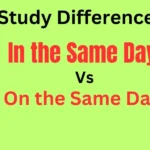Understanding the nuances of language can be challenging, especially when it comes to phrases that seem similar but have different meanings. Two such phrases that often cause confusion are “relate to” and “relate with.”
Although they may appear interchangeable at first glance, these prepositional phrases serve distinct purposes in communication.
“Relate to” expresses connection or relevance, while “relate with” emphasizes interaction or relationship between entities.
In this comprehensive guide, we’ll delve into the correct usage of “relate to” and “relate with,” providing you with the knowledge to use them effectively in both professional and personal contexts.
Relate To Or Relate With: Quick Answer
| Phrase | Meaning | Example |
|---|---|---|
| Relate To | Indicates connection, relevance, or understanding. | “I can relate to your challenges at work.” |
| Relate With | Emphasizes interaction or relationship. | “I relate with my colleagues during meetings.” |
The Basics of Prepositions in English
What Are Prepositions?
Prepositions are small but powerful words that show the relationship between different elements in a sentence. They can indicate direction, time, place, and more.
Common prepositions include words like “to,” “with,” “in,” “on,” “at,” and “by.” Despite their simplicity, the misuse of prepositions can lead to confusion or ambiguity in communication.
Common Prepositional Confusions
The English language has many prepositions, and their usage can vary depending on context, making them tricky to master. Words like “to” and “with” can change the meaning of a sentence entirely, depending on how they’re used.
This is why understanding the specific functions of “relate to” and “relate with” is crucial for clear and effective communication.
Breaking Down ‘Relate To’
Meaning and Usage
The phrase “relate to” is widely used to express a connection, relevance, or understanding between two things.
It often implies a direct association, where one thing has a significant impact or connection to another.
- Understanding: When you say, “I can relate to your experience,” you’re expressing empathy or understanding because you’ve had a similar experience.
- Connection: In a more formal context, “This data relates to our sales figures,” indicates that the data is directly connected or relevant to the sales figures being discussed.
The versatility of “relate to” allows it to be used in various contexts, from personal conversations to academic writing.
Contextual Nuances
The phrase “relate to” can have slightly different meanings depending on the context in which it’s used. Here are a few examples:
- Personal Connection: “I relate to the character in the movie” suggests that you see yourself in the character’s experiences or emotions.
- Topic Relevance: “This report relates to our previous discussion” indicates that the report is relevant to the earlier conversation.
These subtle differences underscore the importance of context when using “relate to.”
Examples in Everyday Language
- Personal Example: “I relate to your struggles with learning a new language. It’s challenging but rewarding.”
- Professional Example: “The client’s concerns relate to the delays in project delivery.”
- Academic Example: “This study relates to previous research on climate change and its impacts.”
In each of these examples, “relate to” serves to connect the subject to something relevant or significant.
The Unique Case of ‘Relate With’
Less Common Usage
Unlike “relate to,” the phrase “relate with” is less commonly used in English. It typically refers to the way two or more people or things interact or communicate with each other.
The usage of “relate with” often emphasizes the method or manner of interaction rather than the connection itself.
- Interaction: “I relate with my colleagues through regular meetings and open communication.”
While “relate with” is grammatically correct, it’s less frequently used because “relate to” often covers similar meanings with greater clarity.
Contextual Differences
“Relate with” is best used when describing a mutual relationship or interaction between two or more entities.
Here are some scenarios where “relate with” might be appropriate:
- Collaborative Efforts: “The team members relate with each other through shared goals and cooperation.”
- Interpersonal Relationships: “She relates with her students by being approachable and understanding.”
In these cases, “relate with” highlights the interaction or relationship between parties.
Comparative Examples
To better understand the difference between “relate to” and “relate with,” let’s look at some side-by-side examples:
| Relate To | Relate With |
| “I relate to his situation.” | “I relate with him through our discussions.” |
| “This issue relates to the company’s policy.” | “The manager relates with employees during weekly meetings.” |
In the first example, “relate to” expresses a connection or understanding of a situation, while “relate with” in the second example emphasizes the manner of interaction between people.
‘Relate To’ vs ‘Relate With’: Key Differences
Direct Comparison
The key difference between “relate to” and “relate with” lies in their usage and the connections they imply.
“Relate to” is used to show relevance, connection, or understanding, while “relate with” focuses on the interaction or relationship between entities.
- Relate To: Indicates a connection or relevance to something.
- Relate With: Emphasizes interaction or the way two entities relate to each other.
Practical Usage Guidelines
Here are some guidelines to help you decide which phrase to use:
- Use “Relate To” when talking about relevance, connection, or understanding.
- Use “Relate With” when focusing on the interaction or relationship between people or things.
Common Mistakes to Avoid
- Overusing “Relate With”: Many people try to use “relate with” when “relate to” would be more appropriate. Remember, “relate to” is more commonly used and understood.
- Confusing Contexts: Avoid using “relate with” in situations where you’re discussing relevance or understanding. Reserve it for interactions or relationships.
Real-World Applications
In Professional Settings
In professional communication, using “relate to” and “relate with” correctly can enhance clarity and prevent misunderstandings.
- Emails: “The client’s feedback relates to the recent product update” is clearer than “relates with.”
- Meetings: “This point relates to our previous discussion about budget cuts” ensures everyone understands the connection.
- Presentations: “These figures relate to last quarter’s performance” helps draw a clear link between data points.
In Personal Conversations
In everyday conversations, using these phrases correctly can make your communication more precise and relatable.
- With Friends: “I relate to your frustration” is more appropriate than “I relate with your frustration.”
- Family Discussions: “This issue relates to what we talked about earlier” keeps the conversation clear and focused.
Social Media and Casual Writing
On social media and in casual writing, people often blur the lines between formal and informal language.
However, maintaining clarity with phrases like “relate to” can still make your message stronger.
- Social Media Post: “I relate to this meme so much” resonates more than “I relate with this meme.”
- Blog Comments: “This article really relates to what I’m going through” connects your experience with the content.
What People Ask
1. What is the main difference between “relate to” and “relate with”?
“Relate to” means understanding or having a connection, while “relate with” focuses on interaction or relationships.
2. Can “relate to” and “relate with” be used interchangeably?
No, they have different meanings and are used in distinct contexts.
3. Is “relate with” commonly used in English?
No, it is less common and typically refers to interactions or relationships.
4. How do I know when to use “relate to”?
Use “relate to” when expressing relevance, connection, or empathy.
5. Can you provide examples of both phrases?
- Relate to: “I relate to her experience.”
- Relate with: “She relates with her team through open communication.”
Conclusion
Recap of Key Points
Understanding the difference between “relate to” and “relate with” is crucial for clear and effective communication.
While “relate to” is commonly used to express relevance, connection, or understanding, “relate with” is best reserved for interactions and relationships.
Final Advice
Practice using these phrases in different contexts to build confidence in your language skills. The more you use them correctly, the more natural they will become in your everyday communication.
Call to Action
Have examples of when you’ve used “relate to” or “relate with“? Share them in the comments below and let’s discuss how these phrases impact our communication.

As an experienced English teacher, I’m Jessica Thompson, here to make grammar and vocabulary simple and fun. Join me on TalkSpeaker as we explore the language together, one lesson at a time!



